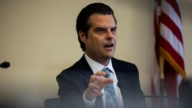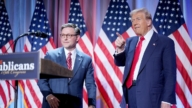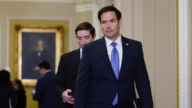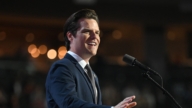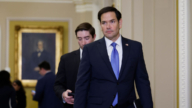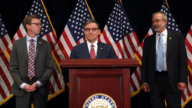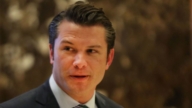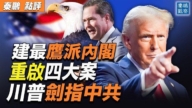【新唐人2012年10月22日讯】2012年美国总统大选正在如火如荼的进行。两位总统竞选人奥巴马和罗姆尼,登台上演精彩的电视辩论,各自力争博得更多选民支持。这一选举盛况也引来很多中国民众关注。但相对于美国选民投票决定未来的总统来说,同样将在11月举行的中共“18大”则是个黑箱子,离中国普通民众距离遥远。请看下面的报导。
随着11月6号美国大选选举日的临近,美国总统竞选人,现任总统欧巴马和马萨诸塞州州长罗姆尼之间的选情持续绷紧。他们在10月3号、16号相继进行了两场电视辩论。“盖洛普民意测验中心”公布的民意调查显示,大多数美国人认为,共和党的罗姆尼赢得了第一场辩论,而民主党的欧巴马赢得了第二场辩论。
在第二场激烈辩论之后,奥巴马到新罕布希尔州等地为自己连任总统拉票。罗姆尼则除了18号与欧巴马一同出席一个慈善筹款活动外,没有安排其他公开活动。据说,罗姆尼正在佛罗里达州为22号的最后一场电视辩论做准备。
“盖洛普”分析,第二场辩论的结果可做为选举的重要观察指标。而最新民调显示,欧巴马的领先优势逐渐缩小,46%的选民表示11月6号会投欧巴马一票,而表示支持罗姆尼的,也有45%。
美国公民Jason:“我们从报纸、电视、广播、网络上去了解总统和总统候选人。我们有很多的独立渠道去了解他们,从而做出投票决定,那里会有很多关于总统和侯选人的正负面信息。”
美国公民Jason本人从1980年开始参与选举,选过很多位总统和地方官员。他对《新唐人》表示,美国的总统候选人可以由各党派推荐,也可以独立参选。因为未来的总统关系到美国和自己的命运,美国人都很关心选举。
而在地球的另一边,美国的选举也引起了中国大陆民众的关注。 《美国之音》报导,中国网民观看欧巴马和罗姆尼的辩论录像,在网上讨论美国总统候选人的辩论技巧,并且思索这对中国来说意味着什么。此外,中国各媒体对美国大选做了很多深度报导,但对即将于11月8号开幕的中共“18大”高层权力交接却较少报导,这形成了鲜明对比。
对此,北京宪政学者陈永苗表示,中国和美国无法在这一问题上进行比较。美国完全是民主的选举,而中共下届最高领导人早就已经内定,老百姓无法参与,也不关心。
北京宪政学者陈永苗:“美国的这个民主选举,实际上是全民的一个嘉年华,全民能够狂欢,是一个过节。而中国的领导人选举,老百姓都是在地上,国家领导人在天上。这种东西它是隔开的。”
曾经因为独立参选“人大代表”,而被关押软禁的江西新余维权人士刘萍认为,美国的选举有监督、有竞争,因此是透明、公正的。而目前中国所谓的“人大代表”并不是老百姓选出来的,代表不了民意,大陆的独立候选人更是处境艰难,被严厉打压。
江西独立参选人刘萍:“湖南衡阳涌现了大批的独立参选人,个个都非常理智,就是用选举法来进行一个公民的行动,但是这个行动都被垄断了、被否决了。(中共当局)不择手段,全盘否决(这些)初步候选人。”
据报导,随着中共“18大”临近,大陆当局所谓的“维稳”力度也不断加大。北京市日前成立“18大安保指挥小组”,开展“流动人口管理”等十大专项行动,对所谓“不稳定因素”加大打击力度。湖北省则宣布全省6万警察取消休假,进入战时状态。这与美国的“选举嘉年华”形成了鲜明对比。
采访/刘惠 编辑/李谦 后制/肖颜
Facing a critical point, Chinese people are concerned about the U.S. Election
The 2012 U.S. presidential election is in full swing.
The two presidential candidates, Obama and Romney,
performed exciting televised debates, striving to win more voters’ support.
This spectacular event also attracted a large amount
of attention from the Chinese public.
However, compared with American voting, the 18th National
Congress of the CCP,
simultaneously held in November,
is a black box kept away from ordinary Chinese people.
Please see at the following reports.
With the U.S. Presidential Election Day approaching
on November 6, tension is mounting between
U.S. President Barack Obama and his challenger,
Massachusetts Governor Mitt Romney.
On October 3 and 16, they carried out two televised debates.
The opinion polls, released by the Gallup poll, showed that
most Americans believe Republican Mitt Romney won the
first debate, while Democrat Barack Obama won the second debate.
After the second intense debate, Obama took his Presidential
campaign to New Hampshire and other areas.
However, Romney didn’t arrange for other public activities
except attending a charity fund-raising activity on the 18th, which Obama also attended.
It’s said that Romney is preparing for the last televised debate
in Florida on the 22nd.
Gallup analyzed that the results of the second debate might
be an important reference for the election.
The latest polls show that Obama’s lead
is gradually narrowing.
46% of voters say they would vote for Obama on Nov. 6,
while Romney had 45% support.
U.S. citizen Jason: “we learned about the president from
the newspaper, TV, and radio.
We can go on the Internet and find out things about
the presidential candidates, so we can decide based on lot of different independent information.
There is positive and negative comments about
both president and the candidate running against president."
U.S. citizen Jason has participated in elections since 1980
and voted for many presidents and local officials.
He told NTDTV that the U.S. presidential candidate might
be recommended by each political party, and there may also be an independent candidate.
As the next President relates to the United States and their
own destiny, every American is very concerned about the election.
On the other side of the Earth, the U.S. election has aroused
the concern of the Chinese people from the mainland.
VOA reported that after many Chinese netizens watched
Obama and Romney’s debate video, they discussed
the American presidential candidates’ debating skills,
and thought about the meaning in relation to China.
In addition, China’s media produced many in-depth
reports on the U.S. presidential election.
In stark contrast, there were a lot less reports on the coming
18th National Congress of the CCP on November 8, in which the top power of the nation will be transferred.
For this, Beijing constitutional scholar Chen Yongmiao said
that on this issue, China could not be compared with the U.S.
The U.S. holds democratic elections, while the CCP’s
next leaders have already been decided on internally.
The people are given no right to participate.
Beijing constitutional scholar Chen Yongmiao:
“This democratic election in the U.S., in fact, is a carnival of all the people, all the people are carnival, it is a feast.
In China’s leader elections, the people are on the ground,
the national leaders are in heaven; this is separated.”
Participating independent candidate deputies
have been placed under house arrest.
The human rights activist in Xinyu country, Jiangxi province,
Liu Ping, believes that
there is supervision and competition in the U.S. election,
and therefore it’s transparent and impartial.
At present, the so-called deputies are not elected by the people;
they can not represent public opinion.
The situation of the independent candidates in Mainland
China is very difficult, they are severely suppressed.
Jiangxi independent candidate Liu Ping: “There emerged
a large number of independent candidates in Hengyang city, Hunan province, and all of them are very sensible;
It’s a citizen’s action with electoral law, but the action
is monopolistic.
(Communist authorities) rejected the overall preliminary
candidate."
According to the reports, with the approaching of
the 18th National Congress of the CCP, the so-called
“stability maintenance" efforts of the mainland authorities
have also been ramped up.
Beijing has established the 18th National Congress security
command team to carry out the ten special actions
such as management of floating population, and have
intensified the crackdown of the so-called unstable factors.
Hubei Province announced that the province’s 60,000
police officers’ holidays were canceled due to the wartime-like state.
This is in stark contrast to the U.S. Elections.


